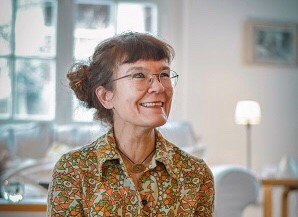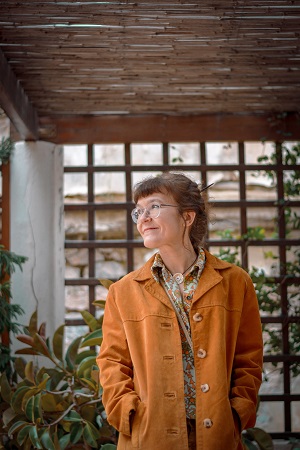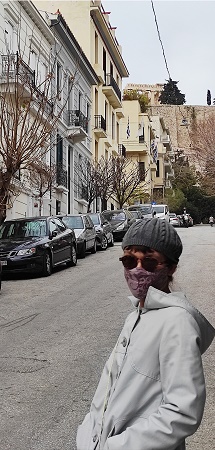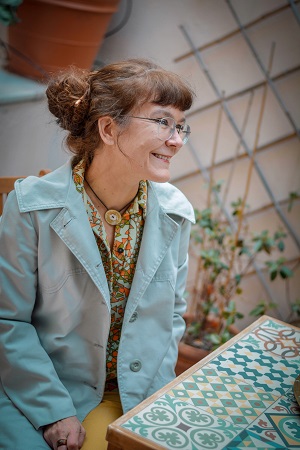Finns in Greece: Petra Pakkanen returns to Athens like Odysseus to his home
Petra Pakkanen, Director of the Finnish Institute at Athens, has returned to Athens after a twenty-year break. She thinks the best thing about Greece is light, both in the sky and in people's minds. Petra's enthusiasm for classical studies began with studying Latin in Kajaani and has taken her to Greece and to many other countries as a scholar. Her own current research concerns tanning of leather in ancient Greece, and through that we learn that also in Finland there is a long tradition of tanning and within it for example a specialty of tanning fish skin.

1. What's your background on Greece and Athens?
I moved from Greece about 20 years ago. Before that, I lived here for almost eight years. I worked at the Institute at the time as an assistant (currently entitled research teacher or assistant director) and then as a researcher. The Institute was located in the same premises, but not all the properties the institute currently runs were there yet. At that time, the Nordic library and the Koroneos Building, operating as a housing facility/hostel, were opened. Some of our current colleagues were already then members of the Institute’s staff.
2. What made you interested in ancient Greece in the first place?

In Finland, the interest in antiquity has mainly stems from interest in languages and it is not related to social issues in the same way as in many other countries. I myself studied Latin in high school in Kajaani, and interest in languages led to studies in the university and cultural research. My first research mission was at the Athens Institute, and it led me to my own long academic Odyssey. Nowadays, researchers often have to move from a country to another, since vacancies are no longer available in the same way as before, and research is increasingly project-oriented.
3. What is the main task of the Finnish Institute at Athens?
Finnish institutes across the world are divided into cultural and scientific institutes. The institutes of Athens, Rome, Beirut and Japan are research institutes. In Athens, the focus is on antiquity, but not exclusively since the research carried out at the Institute concerns periods from antiquity till the present day.
The production processes in ancient Greece have been exclusively studied; for example, ceramics and metal production have attracted lots of scholarly attention, but an important yet gruesome process such as leather tanning has not been part of the research tradition. Despite this, leather was everywhere in ancient times, it was made into transport containers for liquids, and the army and agriculture also needed leather in various forms. During my term of office at the Athens Institute, the aim is to map out, among other things, this less studied theme as one of the Institute's research projects.
Research is always a narration of what we think of the research subject and why we think people acted as they did.
4. How can a person, who is not dedicated to ancient studies, participate in the Institute's activities?
We have a low threshold, and we don´t only deal with issues that are complicated to approach. For example, we are engaged in translation of Finnish literature, and our colleague Maria Matrzoukou has translated Finnish literature into Greek more than anybody else has.
We also have cultural and artistic activities and we are engaged in cultural exchange between Finland and Greece in both directions. For example, at the moment we are planning a 30th anniversary tour of the MeDicanto Choir in October. I hope it will work out despite the Covid outbreak.
The events of the Institute are open to the wide audience, and archaeological fieldwork is also generally open to the public on sites where visiting is allowed. Cooperation with the Embassy will be intensified, too.
5. How do you feel about returning to Athens?

It truly feels like coming home! I am meeting old friends and people I already know. When I had a gap of a couple of years not visiting Athens and came back, I noticed that Athens had become much more dynamic. Art rose from the bottom up, which was also reflected in the street view and it generated good energy in the city. I hope that this good energy will not be stifled by the Covid outbreak.
The Olympic Games in 2004 changed Athens physically a lot. When the metro started operating the infra improved and the movement became smoother. Yet, the same streets and houses, of course, will remain. A scholar of ancient studies cannot escape the presence of the Acropolis.
The Institute is a research institute and I want to carry out my own research here, to develop the Institute and also approach other parties than researchers. The role of the Institute must be verified and the legitimacy of its existence continuously redeemed. Next year, the funding base of all Finnish cultural and scholarly institutes will face a major change and challenge once their funding will no longer be based on the Finnish government-owned betting agency Veikkaus. At the moment, along with all institute staff I am concerned about the continuity of activities and the preservation of jobs.
6. What is on top of your job right now?
In connection with my own research on tanning and leather production in ancient times, the plan is to make a documentary film on the subject with the aim of disseminating research wider and thereby avoiding the situation when the issue does remains in the awareness of a small research community only. It is also interesting to compare leather crafts in Greece and Finland.
For once, Covid outbreak has provided us with a possibility to carry out maintenance work, such as archiving, for which there rarely is extra time in the usual every day.
7. How does the second summer of Covid outbreak look like in the Institute's activities?
Our programme is designed so that the events can be carried out in various formats. An alternative to the ‘real life’ presence is an online implementation or a hybrid model, i.e. a combination of the two. At the moment, the big question mark is whether students can get here to work in the field.
Research is an international engagement and scholars and students from many countries, such as Sweden and France, are involved in our work. Networking is naturally positive in itself, but that makes us also dependent on the varying covid-situation in many countries.
As there are many uncertainties associated with the spring, our events have, as a precaution, been planned to take place in the latter half of the year and thus we may have busy autumn ahead.
8. Finland's history may come across as modest compared to that of ancient Greece, but what does Finland have to offer?

The great European countries brought up the legacy of ancient Greece when the nation states were being born in the 18th and 19th centuries. Greece was then under Ottoman rule. So, the rest of Europe adopted the legacy of ancient democracy before Greece followed the suit in her turn.
Greece's fight for independence took place a couple of hundred years ago. The rise of nationalism even in Finland at the end of the 19th century was consciously linked to the Greek model. Finland's history is different, but not less valuable.
In Finland, the tradition of antiquity, mostly based on philology, has been valued. Classical research is a risky sector as it survival in the academia is questioned every now and then, but Finland has internationally recognized potential in this field.
In connection with my research project on leather and tanning, Finland has its own strong expertise for example in tanning fish skin.
9. What do you think is best about Greece?
LIGHT in many ways: there is the sun and the Greeks have a great ability to look at things lightly, even in the midst of difficulties. Even though Greece suffered from the economic crisis, the cultural energy mentioned earlier emerged from it. And when I moved from Athens to London, I noticed in particular the importance of this Greek light. To me it also means a way of being present and forming permanent friendships.
10. What place is still on your bucket list in Greece?
The nature of Greece is unbelievably beautiful and there are many places where I would like to travel. For example, Drama in Northern Greece is impressive. I have been to Crete for work, but other than that, Crete is the least familiar part of Greece to me. There are still many mountain peaks to climb, and all islands have their own identities.
Editor: Eili Andersson

